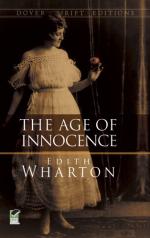Half way between the edge of the cliff and the square wooden house (which was also chocolate-coloured, but with the tin roof of the verandah striped in yellow and brown to represent an awning) two large targets had been placed against a background of shrubbery. On the other side of the lawn, facing the targets, was pitched a real tent, with benches and garden-seats about it. A number of ladies in summer dresses and gentlemen in grey frock-coats and tall hats stood on the lawn or sat upon the benches; and every now and then a slender girl in starched muslin would step from the tent, bow in hand, and speed her shaft at one of the targets, while the spectators interrupted their talk to watch the result.
Newland Archer, standing on the verandah of the house, looked curiously down upon this scene. On each side of the shiny painted steps was a large blue china flower-pot on a bright yellow china stand. A spiky green plant filled each pot, and below the verandah ran a wide border of blue hydrangeas edged with more red geraniums. Behind him, the French windows of the drawing-rooms through which he had passed gave glimpses, between swaying lace curtains, of glassy parquet floors islanded with chintz poufs, dwarf armchairs, and velvet tables covered with trifles in silver.
The Newport Archery Club always held its August meeting at the Beauforts’. The sport, which had hitherto known no rival but croquet, was beginning to be discarded in favour of lawn-tennis; but the latter game was still considered too rough and inelegant for social occasions, and as an opportunity to show off pretty dresses and graceful attitudes the bow and arrow held their own.
Archer looked down with wonder at the familiar spectacle. It surprised him that life should be going on in the old way when his own reactions to it had so completely changed. It was Newport that had first brought home to him the extent of the change. In New York, during the previous winter, after he and May had settled down in the new greenish-yellow house with the bow-window and the Pompeian vestibule, he had dropped back with relief into the old routine of the office, and the renewal of this daily activity had served as a link with his former self. Then there had been the pleasurable excitement of choosing a showy grey stepper for May’s brougham (the Wellands had given the carriage), and the abiding occupation and interest of arranging his new library, which, in spite of family doubts and disapprovals, had been carried out as he had dreamed, with a dark embossed paper, Eastlake book-cases and “sincere” arm-chairs and tables. At the Century he had found Winsett again, and at the Knickerbocker the fashionable young men of his own set; and what with the hours dedicated to the law and those given to dining out or entertaining friends at home, with an occasional evening at the Opera or the play, the life he was living had still seemed a fairly real and inevitable sort of business.




